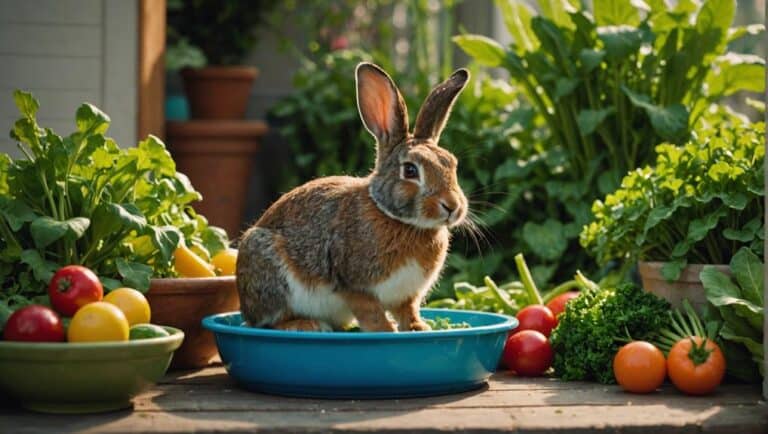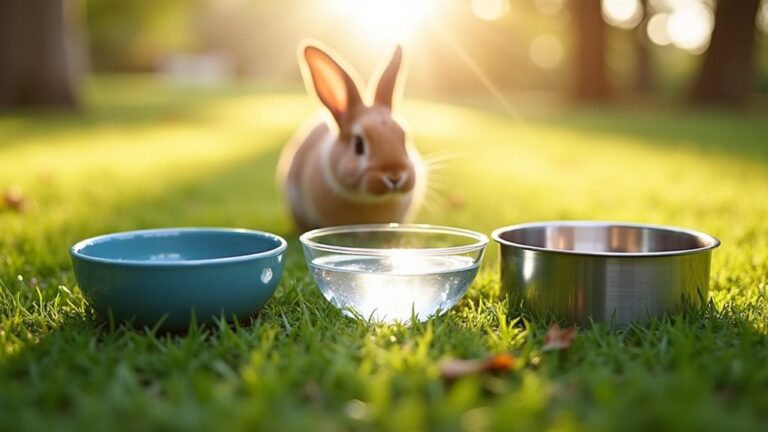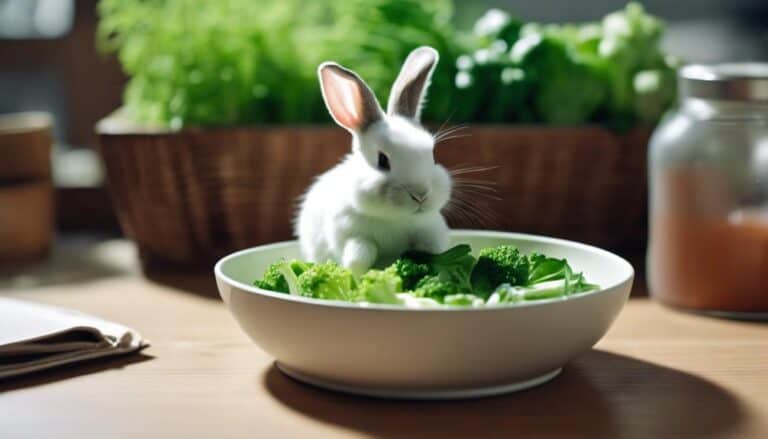Is it really true that fresh vegetables are vital for your rabbit's gut health? You might assume that any food will do, but the truth is, the right veggies can make a significant difference in their digestion and overall well-being. Fresh produce not only hydrates but also provides essential nutrients and fiber that promote healthy gut function. However, not all vegetables are created equal, and there are important considerations to keep in mind. Understanding which veggies to include—and why—could be the key to ensuring your rabbit thrives.
Contents
Importance of Fresh Vegetables
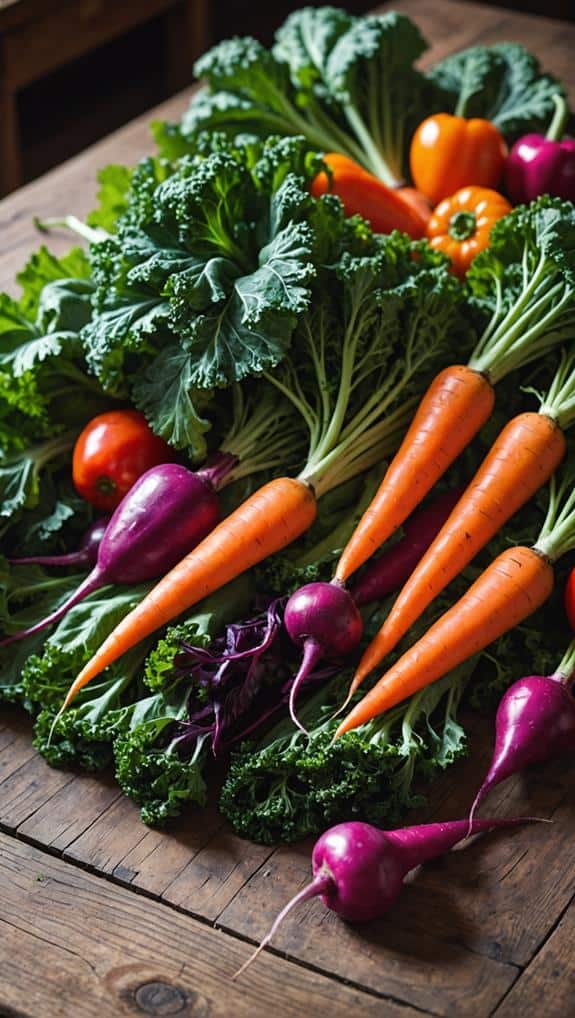
Fresh vegetables play a critical role in your rabbit's diet, providing necessary nutrients and hydration that support their overall health. Comprising about 10% of their daily intake, fresh vegetables, particularly leafy greens, are imperative for maintaining ideal rabbit gut health.
These greens promote digestive health by enhancing gut motility, which helps prevent gastrointestinal stasis—a serious condition that can occur in rabbits. Incorporating a variety of fresh vegetables guarantees a balanced diet while minimizing the risk of oxalate toxicity, as highlighted in the importance of dietary components.
Focus on low oxalate greens like romaine and carrot tops to provide essential nutrition without compromising your rabbit's well-being. Additionally, fresh veggies are composed of over 90% water, greatly enhancing hydration levels. This hydration is important in reducing the risk of dehydration and urinary issues.
When selecting fresh vegetables, it's necessary to wash them properly. This practice eliminates harmful pesticide residues, allowing your rabbit to absorb beneficial nutrients safely.
Nutritional Benefits for Gut Health
Fresh vegetables are crucial for your rabbit's gut health, as they provide essential fiber that promotes regular digestion.
Including a variety of veggies not only enhances fiber intake but also introduces different vitamins and minerals that support overall health, complementing the importance of hay in their diet.
The hydration from these veggies helps soften food, facilitating smoother passage through the intestines.
Additionally, a varied diet rich in nutrients guarantees your rabbit maintains a healthy gut lining and minimizes gastrointestinal issues.
For ideal gut health, remember that hay is crucial but should be part of a diverse diet.
Essential Fiber Intake
Healthy digestion relies heavily on essential fiber intake, particularly from fresh vegetables, which plays a significant role in maintaining gut health in rabbits. By incorporating high-fiber foods like leafy greens and non-leafy vegetables into your rabbit's diet, you promote regular gastrointestinal motility. This can noticeably reduce the risk of gut stasis, a serious condition that can arise from inadequate fiber consumption.
Additionally, including a variety of vegetables, such as leafy greens, enhances the nutritional profile of your rabbit's diet and supports overall health.
Fiber-rich diets not only assist in breaking down food but also facilitate the formation of fecal pellets, ensuring efficient waste elimination. An ideal fiber intake consists of 80-90% hay paired with a variety of fresh vegetables, which is imperative for preventing dental diseases. When rabbits chew these fibrous foods, they naturally wear down their teeth, maintaining good dental health.
Moreover, ensuring appropriate fiber intake helps maintain a healthy gut flora, essential for optimal nutrient absorption and overall digestive health. This balance can also mitigate health risks associated with antibiotic use or poor diet.
Hydration and Digestion
Maintaining proper hydration is fundamental for your rabbit's digestive health. Fresh vegetables play an important role in providing the moisture content necessary to prevent intestinal desiccation. Leafy greens and non-leafy vegetables deliver essential nutrients that not only support digestion but also promote a healthy gut microbiome.
When your rabbit consumes a variety of fresh veggies, it helps prevent gastrointestinal stasis, a serious condition that can arise from insufficient fiber and hydration.
The high fiber content in these vegetables is necessary for effective gastrointestinal motility. Fiber stimulates intestinal contractions, helping to push food through the digestive tract efficiently. This process guarantees that your rabbit's system remains active and healthy, facilitating ideal nutrient absorption.
Additionally, proper hydration aids in softening the food, allowing for easier passage through the intestines.
Incorporating fresh vegetables into your rabbit's diet not only enhances its overall health but also greatly reduces the risk of dehydration and digestive issues. By prioritizing hydration through fresh veggies, you're actively supporting your rabbit's digestive system and contributing to its long-term well-being.
Nutrient Variety Importance
A diverse array of fresh vegetables is necessary for supporting your rabbit's gut health. By guaranteeing nutrient variety, you promote healthy gut flora, which is critical for ideal digestion and nutrient absorption.
Leafy greens, in particular, play an essential role in preventing gastrointestinal stasis—a common health concern in rabbits—by stimulating gut motility.
To maximize the nutritional benefits for your rabbit, consider these significant factors:
- Diverse Selection: Rotate different types of fresh vegetables to enhance the intake of vitamins and minerals.
- High-Quality Produce: Always choose high-quality produce to guarantee your rabbit receives the best nutrients for digestive health.
- Hydration: Fresh vegetables contribute to hydration, which aids in efficient digestive processes, reducing the risk of urinary and digestive disorders.
- Oxalic Acid Balance: By varying the vegetables, you help minimize the risk of excessive oxalic acid intake, supporting long-term gut health.
Incorporating diverse fresh veggies into your rabbit's diet not only enhances their overall health but also promotes a thriving gut flora necessary for their well-being.
Safe Vegetable Choices for Rabbits
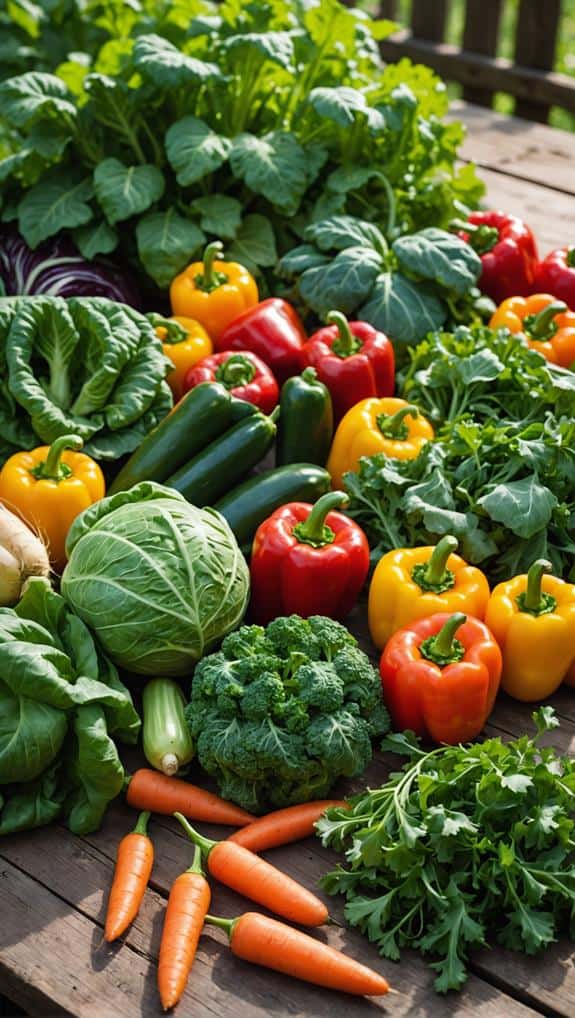
When choosing vegetables for your rabbit, leafy greens should form the basis of their diet, providing essential nutrients and fiber.
Be cautious about introducing high oxalate greens, as excessive amounts can lead to toxicity. Always prioritize safe options like romaine lettuce and wash all vegetables thoroughly to protect your bunny's gut health.
Leafy Greens Importance
Incorporating leafy greens into your rabbit's diet is fundamental for promoting ideal gut health. These greens provide essential nutrients and hydration, which are critical for maintaining optimal gut health. You should prioritize low oxalate options to guarantee your rabbit thrives.
Here are some recommended leafy greens to include:
- Romaine Lettuce: Rich in water content and fiber, making it great for hydration.
- Bok Choy: A nutrient-dense option that helps combat gastrointestinal issues.
- Mustard Greens: Packed with vitamins and minerals, these greens support digestive health.
- Spinach (limited): While nutritious, limit to 1-2 times a week due to high oxalate content.
To promote better digestion, remember to rotate these greens regularly. A varied diet prevents gastrointestinal issues associated with monotony and keeps your rabbit engaged.
Before serving fresh veggies, wash them thoroughly to eliminate harmful residues that could impact your rabbit's digestive health.
Prioritizing leafy greens in your rabbit's diet not only enhances hydration but also guarantees they receive the essential nutrients crucial for their well-being.
Toxic Vegetable Awareness
Understanding which vegetables are safe for your rabbit is just as important as knowing the benefits of leafy greens. Some common toxic vegetables, like onions and garlic, can lead to severe health issues, including gastrointestinal distress. Iceberg lettuce, while often thought of as harmless, can also be detrimental to your rabbit's health.
It's crucial to limit high oxalate vegetables, such as spinach and Swiss chard, to no more than twice a week to prevent oxalate toxicity. Instead, focus on providing safe leafy greens like romaine lettuce, bok choy, and cilantro, which offer essential nutrients fundamental for your rabbit's digestive health.
When serving fresh produce, always wash well to eliminate harmful bacteria and pesticide residues. Having a printed or digital reference list of safe and toxic vegetables will empower you to make informed choices about your rabbit's diet.
This knowledge not only protects your pet from harmful substances but also enhances their overall well-being. Prioritizing safe vegetable choices guarantees that your rabbit thrives on a balanced, nutritious diet, free from the dangers posed by toxic vegetables.
Risks of High Oxalate Greens
High oxalate greens, like spinach and Swiss chard, pose significant risks to your rabbit's health when consumed in excess.
These vegetables can disrupt calcium absorption, potentially leading to kidney stones and other health complications.
To help you understand the risks of high oxalate greens, consider the following points:
- Oxalate Toxicity: Overconsumption can lead to high levels of oxalic acid, which is harmful to your rabbit's kidneys.
- Symptoms: Watch for signs of lethargy, reduced appetite, and urinary issues, which indicate that your rabbit may be suffering from oxalate toxicity.
- Moderation is Key: Limit high oxalate greens to a maximum of twice a week to mitigate health risks.
- Balanced Diet: Regularly rotate in low oxalate leafy greens, like Romaine lettuce and kale, to maintain a balanced diet and prevent excessive oxalic acid build-up.
Proper Feeding Practices
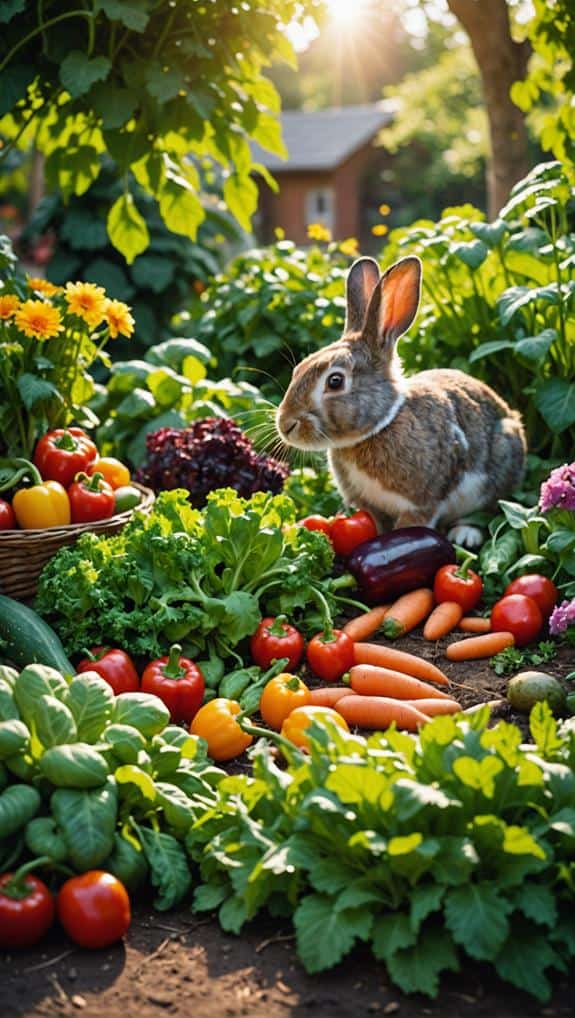
Maintaining your rabbit's gut health requires careful attention to their diet, particularly when it comes to fresh vegetables. Fresh vegetables should comprise about 10% of your rabbit's daily intake, with an emphasis on leafy greens. Aim to serve 1-2 cups of these greens each day to support ideal digestive function.
When introducing new fresh vegetables, do so gradually. Start with one type of low oxalate leafy green every three days and monitor your rabbit for any signs of digestive upset. This approach helps guarantee that each new addition to their diet is well-tolerated.
Always wash vegetables thoroughly before serving to eliminate harmful residues that could affect your rabbit's health.
While non-leafy greens and starchy vegetables like carrots can be included, they should be offered in moderation—excess sugar and starch may lead to gastrointestinal issues.
Regularly rotating different types of greens in your rabbit's diet not only prevents boredom but also contributes to a balanced diet. By carefully monitoring your rabbit's reactions to new foods, you can promote healthy digestive function and support their overall well-being.
Hydration and Digestive Health
Ensuring your rabbit stays hydrated is crucial for promoting digestive health and preventing complications. Incorporating fresh vegetables into your rabbit's diet not only provides moisture but also supports gut microbial balance, which is essential for ideal gut health.
Here are some key benefits of hydration from fresh veggies:
- Moisture Intake: Fresh vegetables deliver essential moisture that helps prevent dehydration, especially if your rabbit doesn't drink enough water.
- High-Fiber Content: Leafy greens assist in moving food through the gastrointestinal tract, promoting regular bowel movements and preventing issues like gastrointestinal stasis.
- Variety: Offering a range of fresh veggies can help avoid digestive upset. Introduce new foods gradually to allow your rabbit's digestive system to adapt.
- Health Complications Prevention: Proper hydration, supported by moisture from fresh veggies, helps avert health issues such as bladder stones and GI stasis, which can arise from inadequate moisture intake.
Final Thoughts
Incorporating fresh vegetables into your rabbit’s diet can be the difference between vibrant health and digestive distress. While a diet lacking in nutrients may lead to gastrointestinal stasis, a varied selection of veggies promotes gut motility and hydration. Balancing safe vegetable choices against potential risks, like high oxalate greens, emphasizes the significance of mindful feeding practices. Ultimately, prioritizing fresh veggies not only supports your rabbit’s gut health but also enhances their overall well-being, making it an essential aspect of responsible pet care. To further enhance your rabbit’s quality of life, it’s important to recognize the role that fresh veggies play in rabbit dental health as well. Chewing on fibrous vegetables helps naturally wear down their continuously growing teeth, reducing the risk of dental issues that can arise from a poor diet. By providing a variety of fresh veggies and rabbit dental health, you’re ensuring that your furry friend remains both healthy and happy, fostering a joyful bond between you and your pet.

